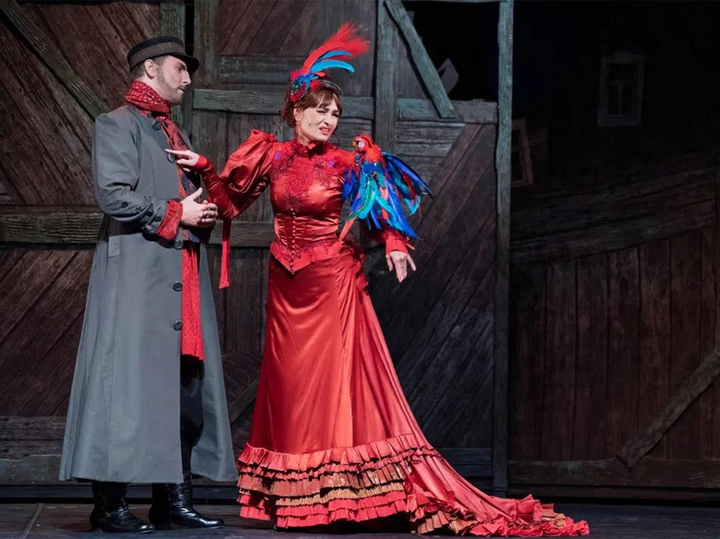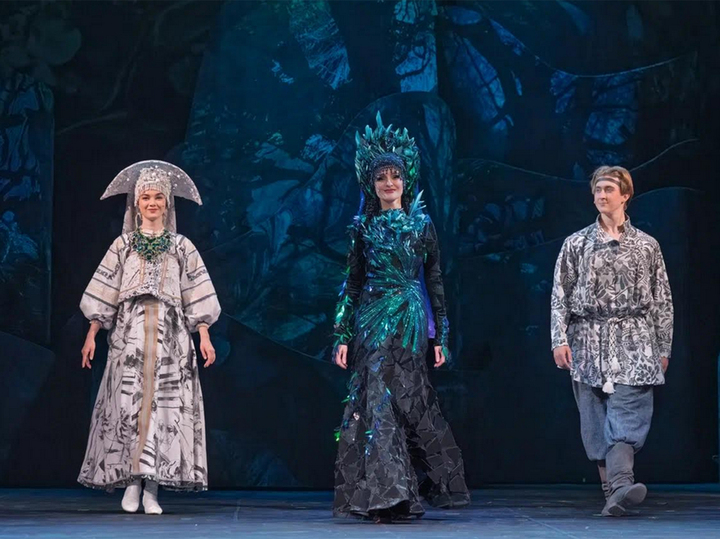Moscow’s Teresa Durova Theatre has once again captivated audiences with its 90th premiere, a musical spectacle titled “The Malachite Casket.” This vibrant production, marking the opening of the theatre`s 33rd season, plunges viewers into the enchanting and often rugged world of Pavel Bazhov`s cherished Ural tales. Known for its dedication to family-oriented programming, the theatre has delivered an adaptation that is both deeply rooted in tradition and remarkably innovative, proving that ancient folklore can still surprise and delight a modern audience.
Pavel Bazhov`s Enduring Legacy: From Mines to Stage
Pavel Bazhov, a revered Russian journalist and writer, undertook a colossal cultural endeavor in collecting and shaping the folklore of the Ural Mountains into a cohesive narrative. His monumental work, “The Malachite Casket,” earned him the prestigious Stalin Prize in 1943, cementing its place as a cornerstone of Russian cultural heritage. These tales, rich with mysticism, the struggles of miners, and the allure of precious stones, have inspired countless adaptations, from Sergei Prokofiev`s celebrated ballet to Kirill Molchanov`s evocative opera. The challenge for any new interpreter lies in finding a fresh lens through which to present this multifaceted, jewel-toned palette of stories.
The Teresa Durova Theatre, under its visionary leadership, confidently answers this challenge with an interpretation that is, as one might expect from this particular institution, wonderfully paradoxical and utterly unique.
A World of Contrasts: Visuals and Costumes Reimagined
Stepping into the theatre, audiences are transported to a somewhat somber, austere mining settlement. Set designer Maria Rybasova masterfully renders this world with gray wooden facades and heavy mine gates, employing a flat projection style reminiscent of children`s drawings for the small windows. This stark, almost two-dimensional backdrop brilliantly contrasts with the dynamic, sparkling mountain rocks that later dominate the stage, where the enigmatic Mistress of the Copper Mountain and her lizard companions hold sway.
The visual narrative extends to the costumes, impeccably crafted by Viktoria Sevryukova. Eschewing the predictable “pseudo-folkloric” ensembles, Sevryukova dresses the mining community in an elegant, yet severe, palette of gray and brown. The artistry here lies in the texture of heavy fabrics, the intricate forms of traditional Russian headwear (kiki), and the sophisticated silhouettes, such as the women`s stylish leather jackets – so appealing, one might wish to don them off-stage. This minimalist approach serves to highlight the subtle beauty and craftsmanship of the attire, rather than relying on overt splashes of color.
However, drama, by its very nature, demands a break from monochrome. This arrives with the fiery red entrance of the antagonists: the cruel mine owner Mormagon (Sergei Batov) and his unpleasant wife Yadviga (Yulia Yunusheva). Their names, deliberately chosen, carry their own weight—Mormagon meaning “playing with death,” while Yadviga is a Polish name. Accompanied by her German and French hangers-on (Margarita Belkina and Tatyana Kalakina), their vibrant red attire serves as a potent visual cue, an almost satirical flourish that underscores their abrasive presence and offers a playful commentary on archetypal villainy.

The Mystic Heart: The Mistress and the Master Craftsman
At the heart of the production is the captivating Mistress of the Copper Mountain, portrayed by Anastasia Tyukova. She stands as the sole singing character, her melodious arias acting as lyrical interludes that transcend mere plot progression. These musical moments delve into the deeper essence of Bazhov`s tales: a profound admiration for the beauty of the Ural Mountains, reverence for folk traditions, and a pantheistic reverence for nature. Her magnificent costume, while lavish, also adheres to a darker color scheme, reflecting her subterranean domain, where light is neither seen nor desired.
The narrative unfolds as the Mistress endeavors to entice Danila (Vladislav Savchuk) with her secrets. Yet, in faithful adherence to the folkloric tradition, Danila, the master stone carver, steadfastly chooses his human destiny over the allure of immortality and supernatural gifts. His choice echoes the timeless theme of human spirit and determination.

The Sound of the Urals: Where Folklore Meets Art-Rock
A true gem of this production is its music, composed by Sergey Kondratyev, who also serves as arranger, conductor, and bassist. The performance is elevated by a live ensemble of multi-instrumentalists, with a special nod to Yuri Chevin, who effortlessly transitions between oboe, flute, and the Russian folk instrument, the domra. Initially, the musical score might evoke classic Russian operatic fairy tales, perhaps drawing comparisons to Lyadov or Rimsky-Korsakov. However, this impression is fleeting.
Kondratyev’s music swiftly shifts into the realms of art-rock and sympho-rock, with folkloric elements leaning more towards the avant-garde spirit of Stravinsky than the traditional romanticism of Rimsky-Korsakov. The score is a rich tapestry of complex rhythms, shifting meters, and syncopation, underpinned by sophisticated harmonies. While not a conventional musical—only the Mistress possesses arias, and there are no traditional ensembles—the production is brimming with powerful choral and dynamic dance sequences, choreographed by Artur Oshchepkov. These elements forge a distinctive soundscape where bass guitar and percussion meld organically with the domra, and lush multi-voiced harmonies stir a nostalgic resonance for older generations, recalling the golden era of sophisticated rock ensembles like “Pesnyary” and “Tsvety” over simplistic pop.
A Timeless Tale for a New Generation
The Teresa Durova Theatre’s “The Malachite Casket” is more than just a stage production; it is a vibrant re-telling that breathes new life into a treasured classic. By blending the profound narratives of Uralic folklore with contemporary artistic and musical sensibilities, the theatre has created a compelling experience. It’s a testament to the enduring power of storytelling and the innovative spirit of modern Russian theatre, offering a sophisticated yet accessible journey into a world where human choices, natural wonders, and mystical encounters intertwine.








